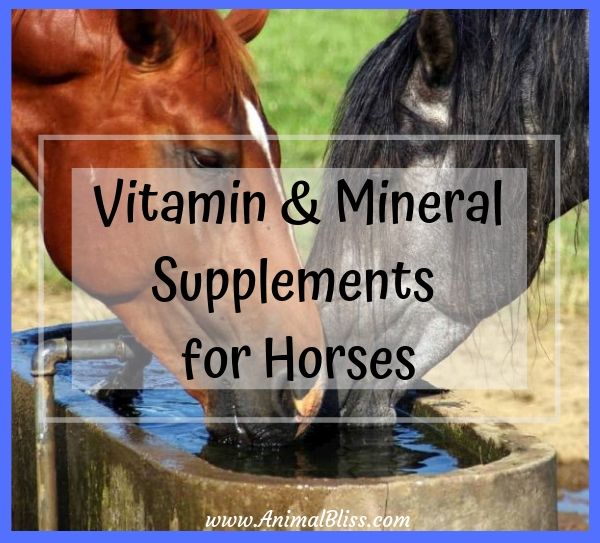A lot of horse owners complain about the vitamin and mineral deficiencies in their horses. These deficiencies can lead to severe problems and diseases. Like humans, horses also require vitamins and minerals in proportion to other nutrients in their diet and are needed in a specific amount. Vitamin and mineral supplements for horses are crucial for their proper development, growth, and regulation of bodily functions.
Your horses need a balanced diet to keep them healthy. Apart from food, make sure to keep them clean and groomed to avoid infections as well as diseases. There are many horse clippers available that can make your task easy. It is good to follow a grooming routine and provide them with proper diets.
Now you must be wondering why vitamins and minerals are vital for a horse. To help all the readers understand why these nutrients are essential, I will mention their functions and all the details in this article.
Importance of Vitamins for Horses
Vitamins are the “vital” or essential “amines” or amino acids that the body requires to carry out essential body functions. There are two types of Vitamins: water-soluble vitamins and fat-soluble vitamins. Vitamin B and C are water-soluble, whereas Vitamin A, D, E, and K are fat-soluble. Each vitamin has a specific role in various functions. Following is a list of all the vitamins and their particular uses.
Vitamin A:
- helps with the health of the eyes and skin
Vitamin B:
- Vitamins B1, B2, B3, B6, and B12 are vital in providing the body with energy from carbohydrates, proteins, protein synthesis, and fat breakdown.
- Biotin, among the B Vitamin group, is helpful for hoof and coat strengthening.
Vitamin C:
- is helpful in the immune system and maintaining respiratory health. It is also useful in restoring Vitamin E.
Vitamin D:
- This vitamin is needed for calcium absorption from the gut. Vitamin D is also produced in some amounts by the skin’s exposure to sunlight.
Vitamin E:
- It is a type of antioxidant that is available in abundance. Antioxidants are beneficial in stressful conditions and help boost the immunity system.
Vitamin K:
- It is essential for the process of blood clotting
Importance of Minerals for Horses
Minerals are the essential molecules required in trace amounts that help with body functions. Minerals are further classified based on their required quantity, such as macromolecules and micromolecules.
Macromolecules are required in large amounts and include calcium, sodium, sulfur, magnesium, potassium, and phosphorus. These minerals are essential for muscle contraction, skeleton development, the function of the nervous system, as well as healthy hair and hoof growth.
Micro molecules, also known as microminerals, are needed in smaller amounts and include minerals such as zinc, iron, manganese, and selenium. These essential minerals help in maintaining connective tissue, nutrients metabolism, and aid transport oxygen to muscles.
To check if your horse is suffering from such deficiency, observe their appearance, output, and performance. If you doubt the health of your horse, you can proceed with tests to confirm. Blood and hair analysis can help in determining levels of vitamins and minerals. If you find the levels to be lower than the standard range or borderline, you can start feeding vitamins and mineral supplements to your horse.
Related:
Regular Horse Grooming for a Healthy and Fit Horse
How to Give Supplements to Horses
There are many options of supplements available in the market today that contain all the essential nutrients needed for the body functions. Such supplements are available in the form of vitamins and minerals premix. You can add this premix to the grain mix that you feed your horses. Make sure that such supplements are fed either with molasses in a pellet or textured feed. It is good to practice this habit of incorporating supplements into the diet to provide complete nutrition to the horse. It also helps in preventing an overdosage of supplements.
It is not recommended to give more than the required amount of such supplements to horses and the recommended dosages are provided on the supplements package itself. Read the instructions carefully and feed your horses accordingly. If the diet already includes all the nutrients in proportion, there is no need to offer such supplements. Also select the supplement based on your horse’s age, reproduction status, weight, etc. Consider all the criteria before making the purchase and feed them with these supplements as per the instructions. You should feed your horses such supplements for 4-8 weeks to see a noticeable change.
~~~~~
“Vitamin and Mineral Supplements for Horses”
Guest Writer: Sharon Vaughn, Content Writer Specialist
Vitamin and Mineral Supplements for Horses #HorseCare #HorseNutrition Share on X
- Mindful Travel With Your Dog This Holiday Season - December 23, 2019
- A-Z of Australia’s Endangered Wildlife - December 20, 2019
- Teaching Your Kids How to Walk the Dog Safely - December 2, 2019


